If mountain biking is your thing, and you’re not really into road bikes, how – and why – would you end up working as a mechanic for a ProTour team? We met Garmin Transisions mechanic Kris Withington recently on the Giro d’Italia, chewin’ the fat at the start of Stage 12 in Citta Sant’Angelo, and so we thought it would be great to find out the answer to that question, and discover a little more about this Giro, as well as life on the road with a top professional team.
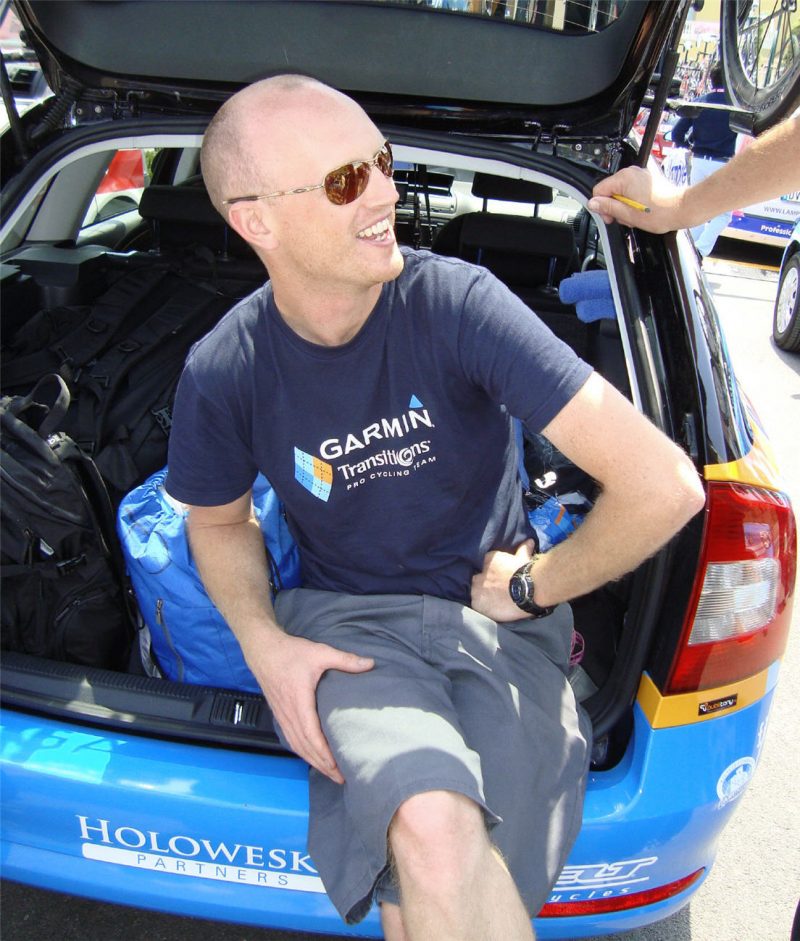
The strada biancha on Stage 7 of the Giro – what effect did that stage have on the equipment?
“Mate, we rode our standard bikes with a bit of extra grease on the chain.
“For the wheels, we used either the Mavic R-Sys or Mavic Cosmic – with 11-27 blocks wrapped in Vittoria 24mm Pave tubulars.
“No problems, no punctures, no nothing.”
So the aftermath of that stage wasn’t any different?
“Not really, it was the ‘same old’, more or less – except that there was about eight teams in the same car park as us, using the same water and electricity, so we had problems with water pressure for our Kärcher water blaster.
“Oh – and the hotel that night was rubbish.
“It took a bit more time cleaning all the bikes of course – plus we needed to clean all the spare bikes and wheels too!
“And we had four cars that were pretty muddy as well.”
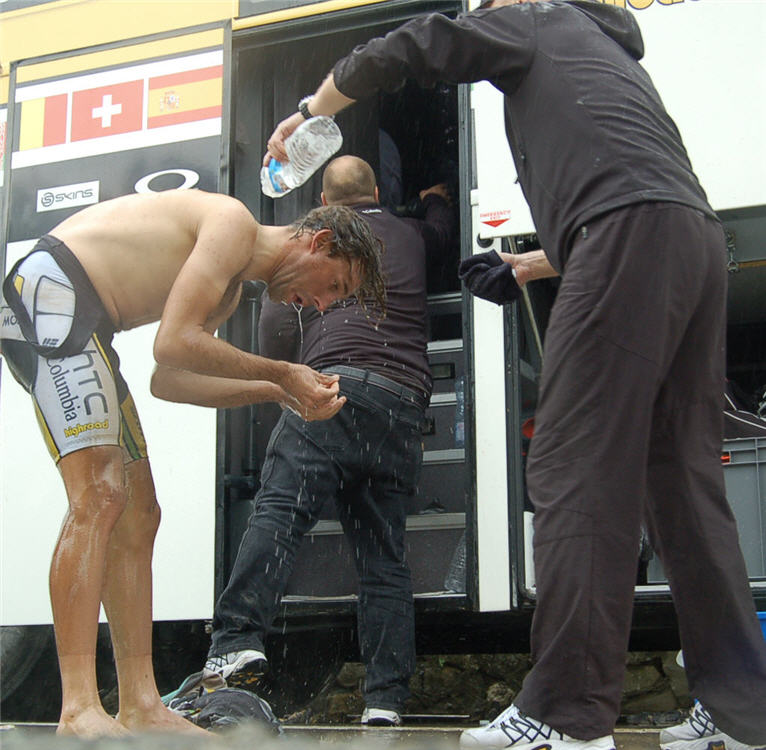
Did any kit get trashed beyond salvage?
“Nah mate, we were sweet.
“We only had to clean and regrease the rear hubs a few days later when we had time.”
The Giro – a unique edition of a special race?
“Ah mate, the Giro is crazy.
“Only in the Giro do you have a 200k drive to the hotel after the penultimate stage, arriving at 9.30 at night with a time trial stage the next day… and everyone is just buckled.
“Not to mention the 1200k drive from Holland to Italy a few weeks before that…”
The riders seem to like the Giro’s quirkiness, what about you?
“It always amazes me how the riders and staff are put through these hours of driving and bizarre hotel transfers, and everyone seems to laugh it off saying ‘well that’s the Giro!'”
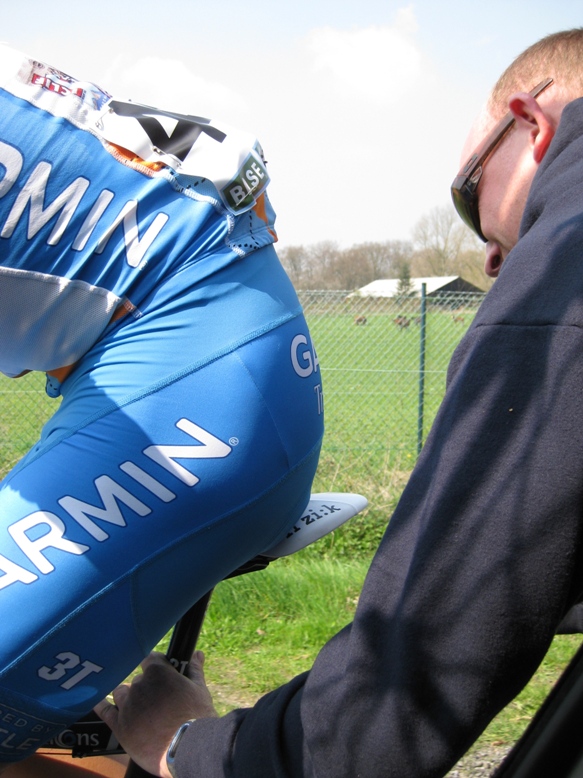
How many bikes did the riders have at the race?
“At the Giro, every rider had one race bike and two spare bikes, plus we had six riders with two TT bikes and the other three had one TT bike.
“Our bikes are all more or less pretty standard. Mr. Millar uses a mechanical Dura Ace group set on his TT bikes as he can get more extension with the gear levers. Tyler Farrar uses mechanical Dura Ace on his road bikes as it has a more positive clunky feel in the sprint, which he likes.”
How many mechanics were on the Giro with you?
“We had three guys there, plus Biso the bus driver who fancies himself with a spanner, so he helps out a bit when needed.”
Does each mechanic have specific riders to look after?
“No not at this Giro.
“We just do whatever work needs to be done.
“Iñaki, ‘el jefe mecanico’ likes to look after Dave Millar’s bikes though – Lord help us if we lay our sweaty paws on his paintwork! (Joking, sort of.)”
How you you divide up the jobs?
“In a grand tour we usually have three mechanics, sometimes four if we are lucky.
“So, two guys go in the race cars following the riders, and the third guy drives the truck to the next hotel.
“The truck driver does all the washing, and the other two splash oil around on the bikes!”
Do you get much time to hang with the riders?
“No, not so much – and we don’t want to really!
“Apart from a bit of chit chat and making sure we have the right sprockets on – that’s about it.”
What time of night do you normally get finished on a grand tour?
“Again, the Giro is special.
“Some nights we weren’t sitting down to dinner until 11pm. But normally we can expect to be finished at the truck at around 8.30 — 9pm.”
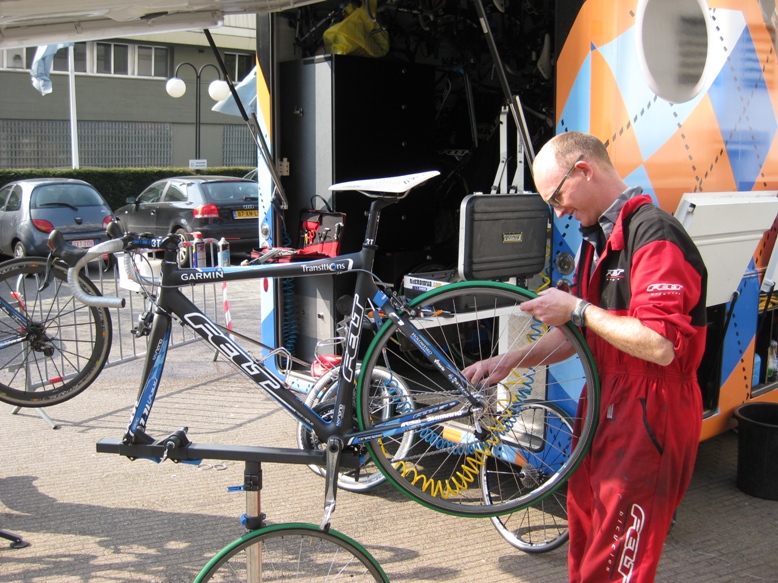
Can you tell us a little about your routine on a grand tour?
“Sure. We finish the stage, and then head directly to the hotel with the race cars, quick smart.
“The mechanic who drove the truck to the hotel is ready and waiting to wash all the race bikes.
“The two mechanics that followed the race in the cars take all the spare material off the cars and wipe it down, or wash it if needed, and load it back into the truck.
“Then they move onto preparing the race bikes for the next day.
“By the time they have finished up with that, the ‘hotel mechanic’ has usually finished all the cleaning and we all close up the truck together.”
What’s your favourite part of the day?
“I think probably dinner time – it’s a good chance to relax and have a bit of a laugh.
“I think the quietest part of the day is at the start area, where we have all the bikes lined up against the bus and we are leaning on the cars yarning to other mechanics – and to you journos. ‘Bonnet time’.”
You told us before about helping other teams on that “big break” day on Stage 11 to L’Aquila…
“I was in our second car that day, and yes, we helped a few guys out who were on their own in the groupetto.
“It’s not an unusual thing to do, as most of the directors who drive the second car behind the groupetto are pretty friendly with each other.
“When the race splits up, and they need to go forward to the next group on the road they ask another team to look after their riders in the group, and vice versa.”
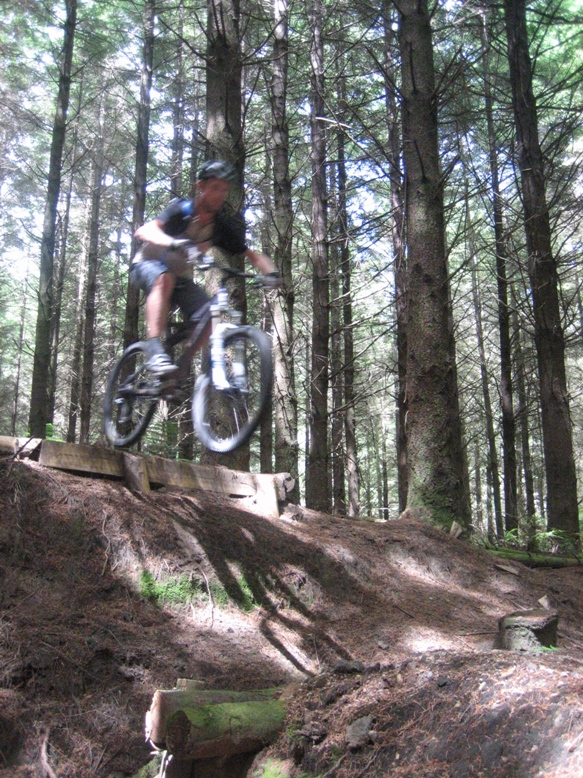
You’re a Kiwi on an American Team – how’d that happen?
“I came to Garmin-Transitions from the New Zealand national team.
“I did a couple of years doing races based domestically, then the NZ Federation established a base in Limoux, near Carcassonne in southern France, and the National coach at the time, Jacques Landry show me the way around Europe from there.
“In 2007, when the Garmin – Slipstream team was expanding and looking for staff, I was at the right place at the right time, as they say.”
Are you able to concentrate on just mechanicing or do you have to do other jobs too?
“No, we all get into the mechanic work as well as the driving.
“I actually really like driving the truck, especially when it’s a bit interesting like in the Dolomites or small carparks.”
Where’s the Team’s Service de Corse?
“It’s right of the A7, in Gerona, Spain, where I live.”
What’s that like?
“Pretty good, nice weather and pretty decent mountain biking!
“My Spanish isn’t great, but I get by. I can get things done – and I know a few swear words and phrases, so that impresses my mates in NZ.”
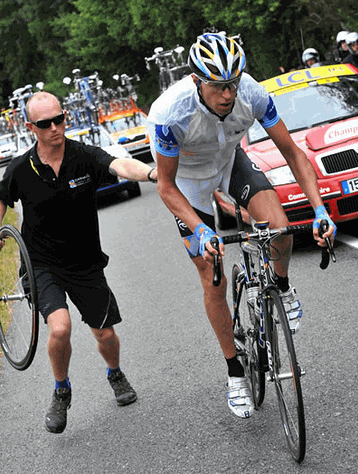
Garmin team spirit?
“Yes, it’s good; it’s something the management and directors work hard on.
“Everyone likes a bit of a laugh and gets on with each other.”
We saw you guys all celebrating at the bus when Tyler won Stage 10 into Bitonoto, everyone was delighted.
“Yeah that win was sweet; not only did it confirm Tyler as one of the peloton’s best sprinters, but the whole team smashed it in the finale there, finished off by JD [Julian Dean] and Tyler.”
Now, all this talk of a ‘motor assist’ in Cancellara’s bike at Flanders and Roubaix, and other pro bikes over the last couple of years – what do you reckon?
“I think it’s hilarious, and gives the bike dork media something to talk about in the lull after the Giro.
“With current battery technology, it’s certainly possible, but I find it hard to believe you can mount a motor with the necessary torque, securely in a carbon frame, without the motor (or the frame) coming to pieces.
“And then trust that frame in the two hardest one day races of the year? I don’t think so.”
How could the UCI prevent further furore?
“X-Ray scanners on the way to sign on!
“Really though, I reckon it will all blow over pretty quickly and there will be something else to talk about next week.”
Do you get excited about new kit, discs, carbon bits?
“Oh, sometimes it is interesting to get a bit of new gear, but at the end of the day the riders still have to pedal the bike – and we still have to wash the thing!
“So really, it ends up being not all that exciting…”
Since you’re a MTB’er at heart, is it ‘just a job’?
“Yep, I’m more interested in my new wide bars for my singlespeed!”
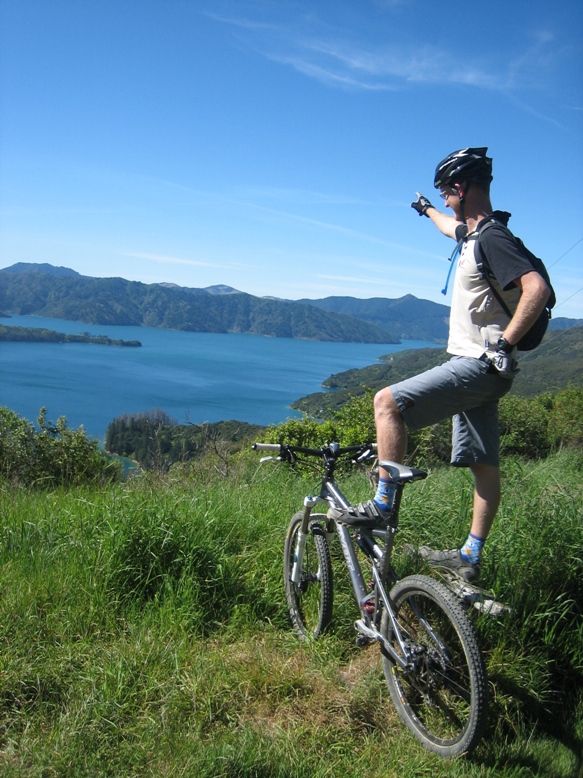
Do you enjoy problem solving for specific rider demands?
“Yes, it’s pretty cool fabricating bits and pieces, and it’s something we do quite often when looking for ways to improve our TT bikes and bars, and so on.
“Mostly it’s the mechanics who come up with the ideas more than the riders demanding something.”
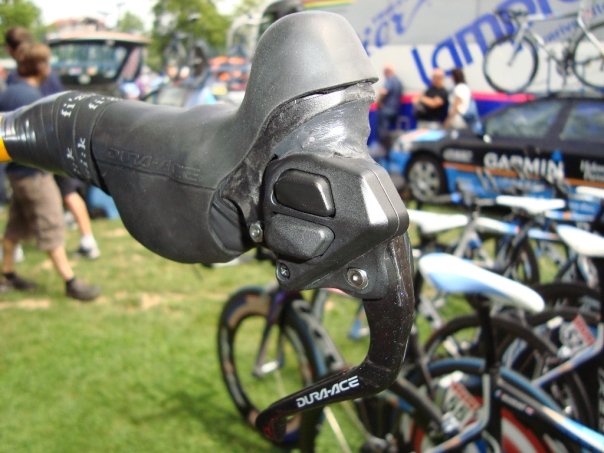
Any other examples of thinking ‘outside the box’ to provide a solution?
“One or two – we’ve been playing around with modifying the Shimano front brake to make it more ‘aero’ since the Tour last year, and we have a nifty little aluminum part we have started to make to mount the Garmin computers between the extensions on our TT bikes.”
Do you have a hotline to Shimano, to offer feedback and make suggestions?
“Yes, Hennie and Peter from Shimano Europe come and see us at most of the big races throughout the year.
“Also, at the Tour the Shimano Dura Ace specialists from Japan visit us at the hotel almost every night, and they often bring special or modified parts for the pro teams.”
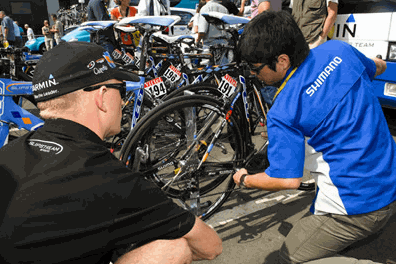
Lastly Kris, why the nickname “Grom”?
“Ha. A mechanic who goes by the name ‘Ol Silverfox’ gave it to me when I was a young lad working in the bike shop after school.
“He reckoned it was from his old surfing days, but I’m not sure he’s ever been to the beach!”
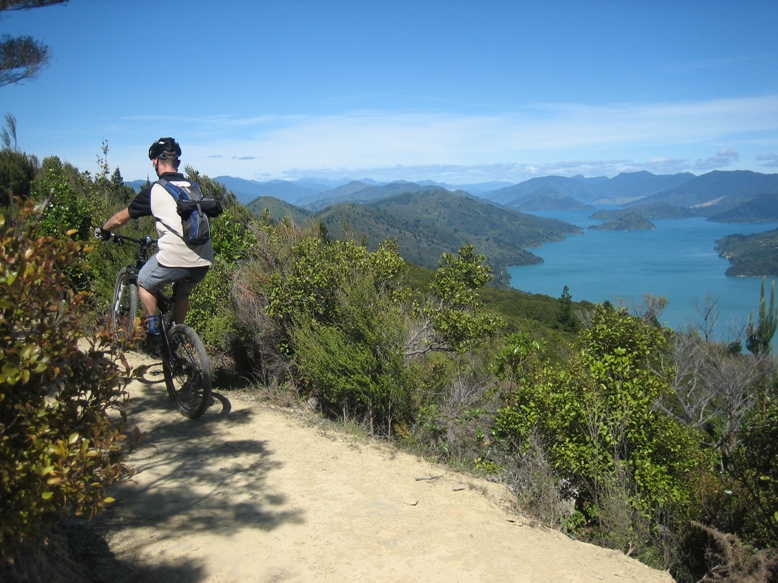
Many thanks to Kris for his time, and we hope to see him again soon – maybe looking after Dave’s bike at the Edinburgh Nocturne? (Just don’t tell Iñaki).



